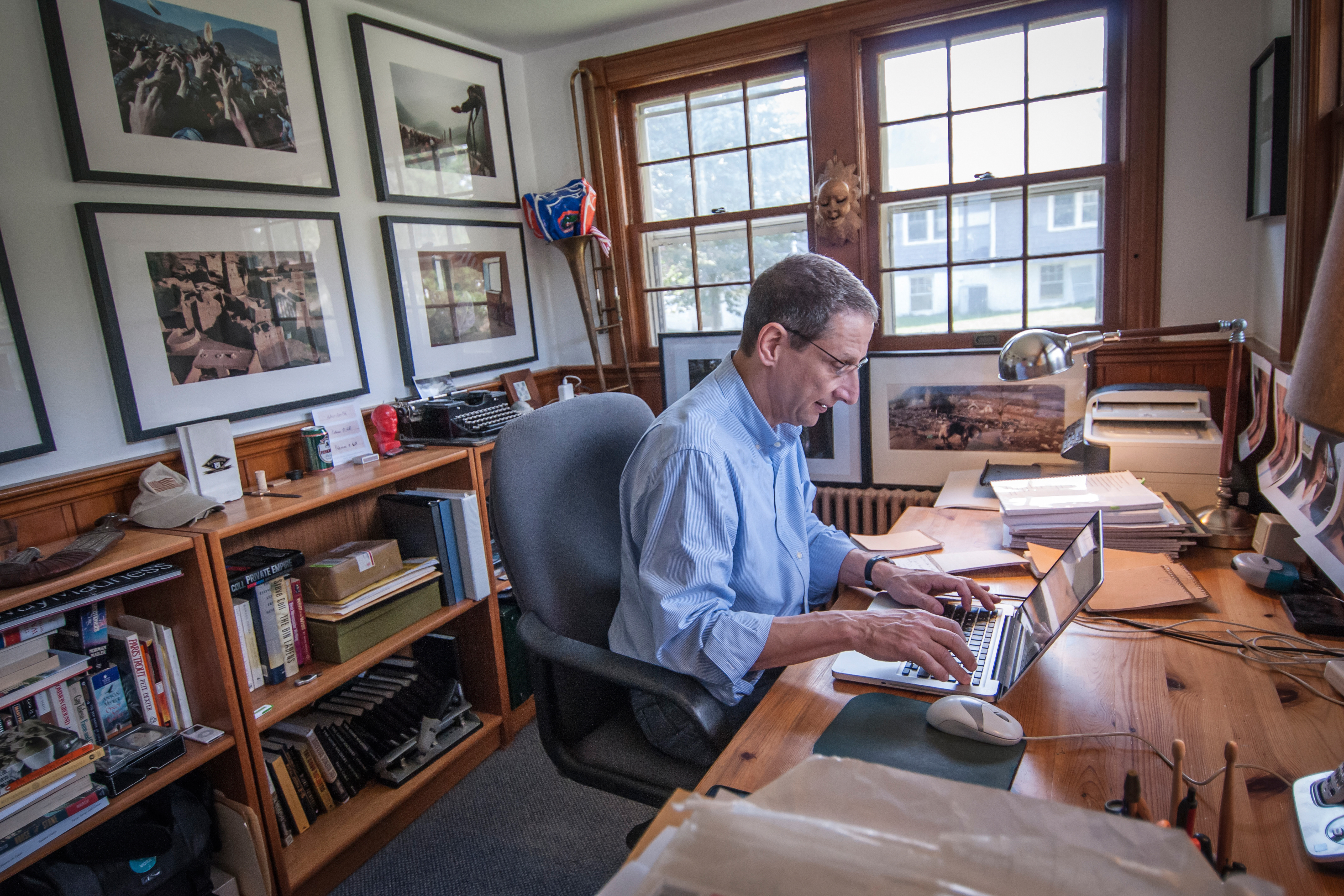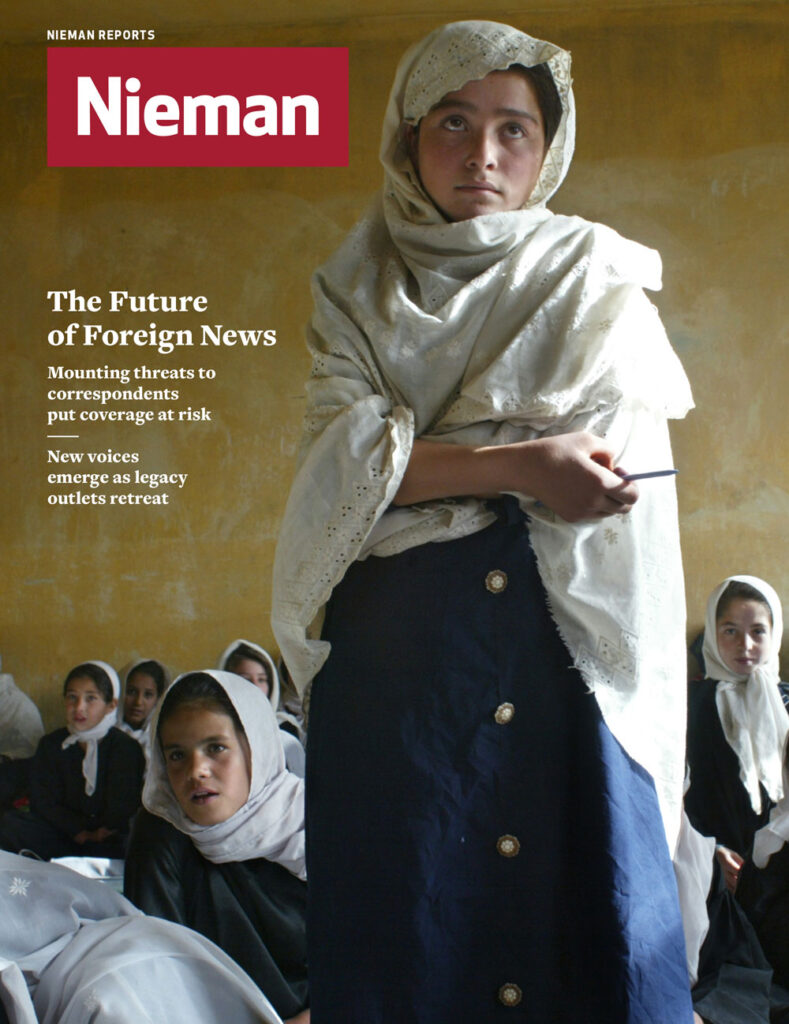David Finkel is a master of immersion reporting, most brilliantly showcased in his two books that follow U.S. soldiers in Iraq and their return to civilian life. A member of The Washington Post staff since 1990, he received a Pulitzer Prize for Explanatory Reporting in 2006 for his three-part case study of the United States government’s attempt to bring democracy to Yemen. The following year, he embedded with a battalion of U.S. soldiers during the Iraq War, an experience out of which he wrote “The Good Soldiers.” He followed that up in 2013 with “Thank You for Your Service.”
During a talk with 2015 Nieman Fellow Dawn Turner Trice at Lippmann House this fall, Finkel described himself as a “pretty ferocious” reporter who favors silence as a reporting tool. He said he tries to recede from the scene in which he immerses himself “so something might occur as if it would have occurred if you weren’t there, if that’s possible.” A 2012 MacArthur “genius” grant awardee, Finkel is now the Post’s national enterprise editor. Edited excerpts:
On his immersion reporting
You don’t know what the story is. There’s just a question that illuminates the work to come. You don’t know the answer. You don’t know the story, but there is a precise question. The question I had in 2007—when the Iraq War seemed, by popular consensus, to have, perhaps, reached maybe its tragic moment, and then [President] Bush announced the surge and here go people into the teeth of this thing—is not to write a book about the Iraq War but to write a book to answer the question of what happens to someone who goes into such a war at such a moment.
I didn’t know, but I went. I spent most of the deployment of this infantry battalion out of Fort Riley, Kansas, they went into the surge, and I went along and embedded with them.
I was just with them through the course of their deployment, trying to figure out the answer to that question, not knowing what would happen, if there would be a story.
It turned out there was, I’m afraid, a pretty extraordinary story of these guys. The thing I want to emphasize, all of this stuff, whatever you might think of writing or longform writing or “feature writing” or immersion writing, the term I prefer is reporting.
Every sentence in this book is, first and foremost, an act of and a result of reporting. Every line in this book, there’s nothing assumed. There’s nothing imagined. That’s the death of a story to me. Every sentence I read is a defensible piece of reporting. If you point to any sentence, I can produce the documents or the interview or the paper, whatever you need to back it up.
What happened is it was a story finally of transformation in many ways, of resulting moral injury, and in so many cases of these 19- and 20-year-old guys who were going into war for the first time, the wiping away of a young man’s sense of invincibility.
On pitching a story
Now, I have a team with six reporters at The Washington Post. They have to answer two questions [when pitching a story idea to me]. They have to be able to complete the sentence without clauses. “This is a story about…” They have some sense of what they’re going after. They have to be able to complete the sentence, “This needs to go in The Washington Post now because…” It has to be a story that they have some understanding of and also occurring in a moment that elevates it to the front page.
On developing trust
It’s the first book that allowed the second. The way I finally got their trust was the fact that they did get to see what a journalist does. That I wasn’t a know-it-all. That I was genuinely curious, that I wasn’t afraid to ask a stupid question if I didn’t know something, and then I stayed and stayed and stayed. I didn’t go away. That helped.
The next thing that helped is this reporting depends a lot on serendipity. You go out, you see what happens. You don’t go out expecting anything to happen, but you’ve got to go. Sometimes when I went out bad things would happen.
When the smoke cleared and the dust settled from an explosion or whatever’s going on, and the soldiers are looking around, now they’re seeing a guy with a notebook or a digital recorder. “Oh, this is what… He’s not a problem for us. This is what he does.”
But finally, I think the thing that got the trust was by staying and doing my job and asking questions, it dawned on these soldiers, a lot of them, not all of them, that I wasn’t there with a preconceived notion, and that I wasn’t going to write some jingoistic, patriotic bullshit about the war effort. That in fact I was documenting what was happening to them. What was happening to them is that they were degrading.
Once they realized that, then they talked to me, and that trust is what allowed the second book.
On never looking back
I don’t know how you all feel about your own work. Whether when you’re done you go back and read it and you feel a sense of pride or revulsion. I don’t go back and look at my work. I don’t want to see it. I just remember all the mistakes and problems.
It’s the same with these books. I can point to any page and look at a sentence and wonder what in the world I was thinking. But the total of it is this is work that I think I got right. I’m proud of these, despite their flaws. I’m proud of this journalism, and I’ve never been able to say that before, so that’s not the worst thing.
On his process
At some point in Iraq I realized as I was writing everything down, “Oh, I think the story here is the transformation.” It’s embarrassing, because this may seem so obvious. What else does war do but transform you? But I didn’t know it was going to do that, and I hadn’t been in war before like this.
You finish the reporting for that story and then again it’s very deliberate. I go over my notes, I index all my notebooks. I transcribe everything.
I reread everything. I’m looking for… because I’m not just a camera you turn on and I record everything. I’m trying to think my way through things. I’m trying to find patterns or I’m trying to find things that might relate in an authentic way.
You read your notes and read your notes and read your notes and eventually I come up with a very specific outline. The outline is guided a lot by, and it’s not just knowing when I write this book, it’s going to be this many chapters. But it’s knowing where the book is going to end.
On listening
I want to reach the point in the story where people aren’t talking to me, where I’m just going along. The people I’m with, they no longer feel the obligation to be a host to me. You want to get past the special moment and let things go. You just want to be there. If people are going to be quiet, let them be quiet, and listen to them be quiet. If they’re talking to each other, hear what they’re saying to each other. That’s much more valuable—don’t you think?—than them answering a question. You have to ask questions. It’s not that benign a process.
For the second book especially, so much of that was built on just being present and being silent. A lot of the second book, these families recovering, took place while they’re in the front seat of the car fighting with each other, and I’m in the back seat just trying to stay behind the headrest so that maybe they’ll forget I’m there.
On getting close
When I went to Iraq the photo editor, the then-photo editor at The Washington Post, gave me a camera and he said, “This thing comes with a zoom lens. I’ve set it on wide. Don’t touch it because it’s going to force you to get close to your subject when you take a picture.” I’ve not heard a better description of the reporting I try to do.
It doesn’t mean I don’t move around, as we all do, to get different perspectives. But what I’m after finally is not distance, but to get as close as I can and stay as close as I can for as long as I can.
For his 2009 book “The Good Soldiers,” David Finkel spent eight months with a U.S. Army battalion deployed to Iraq under the command of Lt. Col. Ralph Kauzlarich. It begins:
His soldiers weren’t yet calling him the Lost Kauz behind his back, not when this began. The soldiers of his who would be injured were still perfectly healthy, and the soldiers of his who would die were still perfectly alive. A soldier who was a favorite of his, and who was often described as a younger version of him, hadn’t yet written of the war in a letter to a friend, “I’ve had enough of this bullshit.” Another soldier, one of his best, hadn’t yet written in the journal he kept hidden, “I’ve lost all hope. I feel the end is near for me, very, very near.” Another hadn’t yet gotten angry enough to shoot a thirsty dog that was lapping up a puddle of human blood. Another, who at the end of all this would become the battalion’s most decorated soldier, hadn’t yet started dreaming about the people he had killed and wondering if God was going to ask him about the two who had been climbing a ladder. Another hadn’t yet started seeing himself shooting a man in the head, and then seeing the little girl who had just watched him shoot the man in the head, every time he shut his eyes. For that matter, his own dreams hadn’t started yet, either, at least the ones he would remember—the one in which his wife and friends were in a cemetery, surrounding a hole into which he was suddenly falling; or the one in which everything around him was exploding and he was trying to fight back with no weapon and no ammunition other than a bucket of old bullets. Those dreams would be along soon enough, but in early April 2007, Ralph Kauzlarich, a U.S. Army lieutenant colonel who had led a battalion of some eight hundred soldiers into Baghdad as part of George W. Bush’s surge was still finding a reason every day to say, “It’s all good.”




